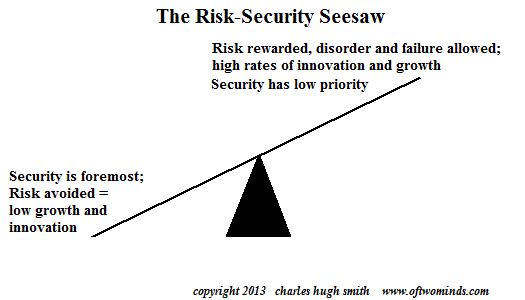The very promise of permanent security dooms the economy to stagnation as complicity, avoidance of risk and passivity are incentivized.
Focusing on econometric data to make sense of our economic ills blinds us to deeper dynamics, for example, the Grand Tradeoff of risk and financial security.
We can visualize this as a seesaw: if financial security is the priority, then risk is avoided. If risk and innovation are rewarded, then security is off the agenda.
Contrast this ontological tradeoff with what Central States around the world have promised their populaces: rock-solid, permanent financial security via guaranteed mortgages, bank deposits, pensions, education and healthcare, and high growth to pay for it all based on ever-expanding innovation.
Sorry, developed-world people; you cannot have it both ways. If everyone is promised financial security, a premium is placed on risk avoidance and complicity with the Status Quo. Why risk failure and disorder for an unpredictable pay-off when "going along to get along" will reap guaranteed pensions, healthcare and an assortment of other entitlement goodies?
If you want growth, you must reward risk and innovation and foster a culture that accepts failure and low-intensity disorder as the norm. Promising financial security in this environment is promising the impossible.
That leads us to the deliciously perverse Grand Irony of the Grand Tradeoff: by fostering expectations of guaranteed financial security, you incentivize risk avoidance, which fosters a low-risk, low-innovation, low-growth economy that is incapable of expanding fast enough to fund all the grandiose promises of rock-solid security made to citizens.
The very act of promising financial security guarantees the promised security is illusory.
If you want a high-innovation, high-growth economy, you must reward risk and accept constant disorder and failure--the very antithesis of guaranteed financial security.
In promising financial security to hundreds of millions of citizens, Central States have in effect claimed that risk--that the promises cannot be kept--has been eliminated. This is an ontological impossibility. Risk cannot be eliminated, it can only be pushed beneath the surface or transferred to others.
If it is suppressed by financial repression and intervention, it doesn't vanish; it slowly builds up like tectonic pressures that are suddenly released in the financial equivalent of a massive, unpredictable earthquake.
If the risk is transferred to the system itself, then it will eventually bring down the system.
Promising financial security is also promising that risk has been systemically eliminated. This is the fundamental dynamic of the "social contract" that underpins societies and economies from Europe to Japan. It is a social contract constructed on an ontological illusion.
If risk is avoided, suppressed and unrewarded, the economy will stagnate and the costs of the promised financial security will crush it. If risk is embraced and rewarded, the resulting expansion is based on a high rate of disorder and failure. Security cannot be promised, because security is illusory.
The very promise of permanent security dooms the economy to stagnation as complicity, gaming the system, avoidance of risk and passivity are incentivized.
"There is no security on this earth; there is only opportunity."
(Douglas MacArthur)
Things are falling apart--that is obvious. But why are they falling apart? The reasons are complex and global. Our economy and society have structural problems that cannot be solved by adding debt to debt. We are becoming poorer, not just from financial over-reach, but from fundamental forces that are not easy to identify or understand. We will cover the five core reasons why things are falling apart:
 1. Debt and financialization
1. Debt and financialization
2. Crony capitalism and the elimination of accountability
3. Diminishing returns
4. Centralization
5. Technological, financial and demographic changes in our economyComplex systems weakened by diminishing returns collapse under their own weight and are replaced by systems that are simpler, faster and affordable. If we cling to the old ways, our system will disintegrate. If we want sustainable prosperity rather than collapse, we must embrace a new model that is Decentralized, Adaptive, Transparent and Accountable (DATA).
We are not powerless. Not accepting responsibility and being powerless are two sides of the same coin: once we accept responsibility, we become powerful.
Kindle edition: $9.95 print edition: $24 on Amazon.com
To receive a 20% discount on the print edition: $19.20 (retail $24), follow the link, open a Createspace account and enter discount code SJRGPLAB. (This is the only way I can offer a discount.)
| Thank you, Robert V.T. ($50), for yet your stupendously generous contribution to this site -- I am greatly honored by your support and readership. | | Thank you, Joseph M. ($50), for your superbly generous contribution to this site --I am greatly honored by your support and readership. |

 1. Debt and financialization
1. Debt and financialization


























